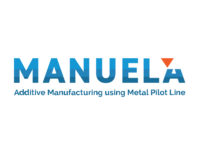
MANUELA
Additive Manufacturing using Metal Pilot Line
Metal additive manufacturing (AM) allows, by enabling use of advanced design, production of high added value components, at levels that cannot be reached with conventional manufacturing technique. Still, the AM-based manufacturing sequence implies large amounts of critical steps – design for AM, AM fabrication, post processing, etc. – compared to conventional production sequences. Presently, the key competencies related to these steps are either not fully implemented at industrial level (process quality monitoring) or dispersed geographically with poor connection between different steps.
Relying on two major AM technologies (LPBF: Laser Powder Bed Fusion and EBM Electron Beam Melting), MANUELA aims at deploying an open-access pilot line facility, covering the whole production sequence, to show full potential of metal AM for industrial AM production. At first, careful instrumentation and adaptation of LPBF & EBM machines will allow increased process reliability and speed. Secondly, the pilot line – including the adapted processes – will be deployed. The hardware layer will integrate novel process quality control monitoring and automated post-AM handling and processing. The line will be fed by design/optimization and AM process simulation workshops. Those workshops will collect continuous feedback from the physical parts of the pilot lines, to increase process reliability and robustness.
MANUELA relies on a consortium composed of industrial end user’s, suppliers, (material/powder, AM hardware, quality monitoring system, software, automation and post-AM treatment) as well as top research institutes in powder-bed metal-AM, covering full range of AM technology chain for pilot line deployment. The deployed pilot line will be validated for use cases, covering wide span of applications including automotive, aerospace, energy and medical. To insure sustainability of the deployed line and its open access at project end, a dedicated exploitation plan will be established.
AMIRES was involved in the project’s preparatory phase and in the negotiations. Within the project it is responsible for communication and dissemination of results and organization of the open calls for pilot customers.
- Partners:
- CHALMERS TEKNISKA HOEGSKOLA AB, Sweden
- CSEM CENTRE SUISSE D’ELECTRONIQUE ET DE MICROTECHNIQUE SA – RECHERCHE ET DEVELOPPEMENT, Switzerland
- FRIEDRICH-ALEXANDER-UNIVERSITAET ERLANGEN NUERNBERG, Germany
- SWEREA IVF AB, Sweden
- CARDIFF UNIVERSITY, United Kingdom
- POLITECNICO DI TORINO, Italy
- HOGANAS AB, Sweden
- ELECTRO OPTICAL SYSTEMS FINLAND OY, Finland
- ABB AB, Sweden
- OSAI AUTOMATION SYSTEM SPA, Italy
- EIDGENOSSISCHES INSTITUT FUR METROLOGIE METAS, Switzerland
- MSC SOFTWARE GMBH, Germany
- SIEMENS INDUSTRIAL TURBOMACHINERY AB, Sweden
- QIOPTIQ LIMITED, United Kingdom
- BIOMEDICAL ENGINEERING S.R.O, Slovakia
- ENEL PRODUZIONE SPA, Italy
- O.E.B. SRL, Italy
- STIFTELSEN CHALMERS INDUSTRITEKNIK, Sweden
- AMIRES, THE BUSINESS INNOVATION MANAGEMENT INSTITUTE, Z.Ú., Czech Republic
- RUAG SLIP RINGS SA, Switzerland
This project has received funding from the European Union’s Horizon 2020 research and innovation programme under grant agreement no. 820774, project MANUELA.